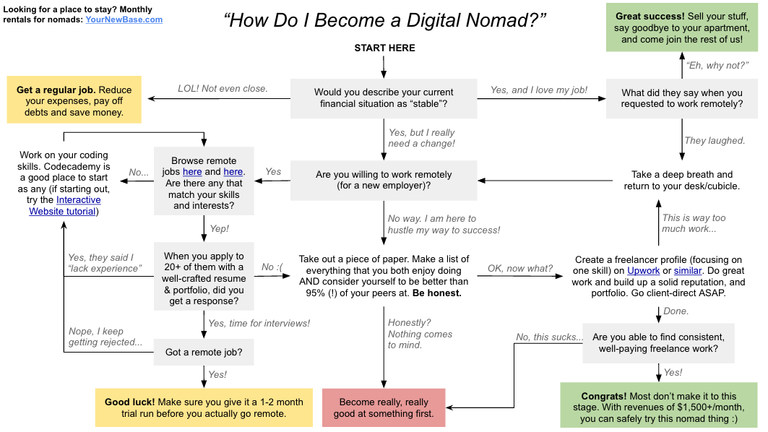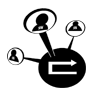Income
Firstly, some caveats. Since there has been so much written recently about this topic there isn’t much for me to add, especially at the tactical level. It is also difficult to include the many different ways in which you earn money because we all have different skills and interests.
Generally speaking, it is usually easier to find work in technical fields such as web and software development, design, video production or SEO. However it is still viable to find work in various forms of writing, translation, virtual assistant work, and teaching english online. Many DN's do not work for anyone and have ecommerce stores or a successful blog. Learn more about these options in my Finance post.
It is also important to make a solid start on sorting out your income before leaving home. Income is a result of doing things of value for others. It’s often difficult for others to see your individual value if they’ve never had a meeting with you. Making business connections overseas is especially tricky because often times you will be placed into a large horde of people trying to achieve similar goals. However many of the people in this horde are likely unqualified and attempting to get money by hook or by crook. Competing with them is a race to the bottom. You want to be offering premium services to clients who appreciate that.
Here it is represented graphically by Nick Andrews:

Ease into it slowly
Work from home for a few months until your customers in the same city get used to working with you semi-remote. After you feel like you and your customers are comfortable with the change, go full remote. Don’t try to change everything all at once. Use your time at home to find recurring customers (marketing from overseas is going to be more difficult, so the less of it you need the better), an accountant and get your business stable. Your clients need to trust you so be as transparent and honest as possible.
Talk to your clients (or not). Give them a couple of months’ notice of your departure so they have time to get used to the idea while you continue to give them a great level of service. Or, if you think they’re going to react negatively, tell them you’re going on a vacation. While on "vacation", amaze them with how much great work you get done for them. Next, break the news that you decided to "extend your holiday" (again, and again...). As you being on holiday has worked out well so far for them, they'll probably continue with the deal.
With those general rules in mind, carve out a niche for yourself and thrive in your unique way. More details are in my Finance post.
Things to get
Your absolute essentials include: credit/debit cards, passport, flight ticket, laptop. But traffic, heat, fake goods and language problems mean buying a few things before you leave will make life easier. See my equipment posts for details.
Skills to master
If you’ve done well with the ‘Income’ section earlier then you will have already learned a lot about written communication, marketing, and productivity. Make sure those are completely stable because the DN life will likely make some rocky changes, especially in the beginning.
How to use Google Maps (really well). Make sure you know how to switch to satellite view, find directions to anywhere, have a city cached for offline use and see traffic density.
Google searches. Everyone thinks they know how to Google, but for whatever reason the DN Facebook groups are flooded with basic questions that could be answered by a Google search. How to search within a site, how to exclude words / sites.
How to search in a Facebook group. If people used the search function, the questions would get asked once, answered thoroughly and I wouldn’t be writing this site. Instead, there are questions like “how do I find a cheap apartment?” in all DN groups every day. The Facebook app has a big magnifying glass icon at the top while inside the group while the web site has a search box in the top right which can be used to search for keywords in the group and get questions answered quickly and easily.
The clock app on your phone can show times all around the world. Put your client's and family’s time in there so you can interact with them at appropriate times.
How to get 3G/4G working. Whenever you go to a new country you’ll need to get a local SIM card (ideally from a kiosk in the airport - the staff there are used to foreigners, know which plans suit you and are better trained) and make it cooperate with your phone. It's usually as easy as placing the sim card in your phone and restarting it.
Sometimes you’ll need to manually set up an “Access point”. Before trying to use a new SIM card, google what the access point is of the cellular network you’re using so if it doesn't work automatically you can put that into the phone’s settings and try to get it working before paying. Ideally the staff there will be able to do this for you, but often not.
If you have more than one SIM card in your phone only one of them is allowed to use 3G at a time. Make sure you have 3G turned on for the right one.
How to make a wifi hotspot from your phone. That 4G connection is your backup for when Wifi isn't working out.
People from USA have the option of using Project Fi, a magical way to have 3G wherever you go without paying crazy roaming rates. If you’ve used it, please let me know how it went.
Organize these
Get travel insurance. All the hospitals up to western standards are private enterprises and some will refuse urgent treatment if they don’t think you can pay. If they know you have travel insurance there will be no hesitation about doing whatever needs to be done. WorldNomads is very popular and good value.
Driver’s license. If you plan on illegally driving a motorbike in SEA then your travel insurance will not cover you. In some countries, having a foreign license combined with an international driver’s license is enough to be considered driving legally so get those if that applies to your country.
Take photos of passport, credit cards, immunization history, travel insurance documents, proof of your address (utility bill, bank statement). This is used as your reference if any of them are lost, but also to prove your identity when registering for financial services. The photographs need to be high quality so that automated software will have no trouble reading them. To do this, use an actual camera instead of your cellphone. A photocopy of your passport isn’t a bad idea too. If you print out your travel insurance documents then proving its existence when time in short (or you are unconscious) is going to be a lot easier.
Bank accounts - one for day to day personal transactions, another for business and another for savings. Accounting is much much easier when all the business expenses and income occur in a separate account. Tell your bank about your travel plans so they don't block your cards when they start being used overseas.
Get your ATM cards organized. Ideally, you should bring two in case one gets lost or blocked. Associate one card with your personal account and the other with your business account. Never store the cards together to minimize the chance of them both being lost at once. ATM skimming is quite common in SEA, so many banks are paranoid about unusual transactions and will block cards that do transactions there. Prior to arriving in another country, contact your bank and communicate your travel plans.
Sign up for NomadList. This is an incredible forum and Slack channel with many long term nomads in it. This community is an amazing source of support, knowledge and advice.
Plan your travel philosophy/strategy
Depending on your priorities and work hours, you will need to figure out an efficient way to get work done while traveling. This will vary with different types of work, but it is important to find a healthy balance of travel and work. If you’re moving around too much it will be difficult to get much work done, and if you're working too much (or become synced/dependent on a timezone) you may begin to feel tied down to a certain location.
There is no one size fits all solution here, so here’s a few things to bear in mind when sketching out your plans:
- Stay in a place for at least 1 week. A week is 7 days but the first and last days are useless because you’ll be packing up and moving (try to make sure those days are on the weekend so it is less of an inconvenience to your customers). You’ll likely lose a day to running around trying to get 4G working, stocking up on groceries, finding a space to work in and getting your general bearings. Next, give one day to sightsee. This leaves 2 full days of work out of 7, which is very inefficient and you only had fun during one of the days. All in all, two weeks is more practical.
- Don’t over-commit. Book somewhere for a few days before prepaying for a month in that beautifully massive penthouse apartment. If it doesn’t pan out like they said it would in the brochure, just leave.
- Keep it loose. If you pre-book all your flights, hotels, etc. for weeks or months in advance it that may make you feel less anxious, but it will close the door to spontaneous opportunities that come up. Too much planning can also result in being forced to leave places you love and having to stay too long in places you hate.
- Have a travel hobby. Combining some activity with your travels will take you to places you never expected and deepen your experience of them. Good examples are volunteering for NGOs, photography, muay thai, meditation, yoga, and dating local people. Anything that gets you meeting people and getting out of the tourist bubble.
... and finally
Have a look at this trello board, titled How to become location independent. It has everything you need to do already laid out for you. If you haven't used trello before, now is the time to start.
Resteemed by @resteembot! Good Luck!
The resteem was payed by @greetbot
Curious?
The @resteembot's introduction post
Get more from @resteembot with the #resteembotsentme initiative
Check out the great posts I already resteemed.
You were lucky! Your post was selected for an upvote!

Read about that initiative